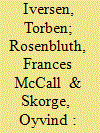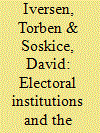|
|
|
Sort Order |
|
|
|
Items / Page
|
|
|
|
|
|
|
| Srl | Item |
| 1 |
ID:
138424


|
|
|
|
|
| Summary/Abstract |
The knowledge economy, deindustrialization, and the decline of Fordism have undermined the economic complementarities that once existed between skilled and semiskilled workers. The result has everywhere been a decline in coordinated wage bargaining and unionization and a notable rise in labor market inequality. Yet, the political responses have been very different across advanced democracies. While labor markets for part-time and temporary employment have been deregulated across the board, some countries have compensated losers through increased cash transfers and active labor market programs and others have allowed inequality and insider-outsider divisions to grow deeper. The article argues that the divergent government responses reflect differences in underlying electoral coalitions, and that these in turn mirror the structure of party and electoral systems. The authors support their argument with evidence for government responses to economic shocks in the period 1980 to 2010.
|
|
|
|
|
|
|
|
|
|
|
|
|
|
|
|
| 2 |
ID:
193644


|
|
|
|
|
| Summary/Abstract |
Growing economic inequality has raised concerns that democratic governments are no longer responsive to popular demands for redistribution either because the state capacity is eroded by footloose capital or because the wealthy subvert democracy through the power of money. In this paper we critically assess these conjectures against long-standing arguments about redistribution and insurance under democracy. We test the alternatives on a new comprehensive dataset on income inequality from 17 advanced democracies between 1980 and 2019. We find that before taxes and transfers income inequality has increased markedly everywhere but also that government redistribution has played a critical role in compensating the middle class and to a perhaps surprising degree also the poor. However, the United States is a large outlier.
|
|
|
|
|
|
|
|
|
|
|
|
|
|
|
|
| 3 |
ID:
171112


|
|
|
|
|
| Summary/Abstract |
Women shoulder a heavier burden of family work than men in modern society, preventing them from matching male success in the external labor market. Limiting working hours is a plausible way to level the playing field by creating the possibility of less gendered roles for both sexes. But why then are heavily regulated European labor markets associated with a smaller share of women in top management positions compared with liberal market economies such as in the United States? We explain this puzzle with reference to the difficulty of ambitious women to signal their commitment to high-powered careers in regulated markets.
|
|
|
|
|
|
|
|
|
|
|
|
|
|
|
|
| 4 |
ID:
088897


|
|
|
|
|
| Publication |
2009.
|
| Summary/Abstract |
The authors present an alternative to power resource theory as an approach to the study of distribution and redistribution. While they agree that partisanship and union power are important, they argue that both are endogenous to more fundamental differences in the organization of capitalist democracies. specifically, center-left governments result from pr consensus political systems (as opposed to majoritarian systems), while strong unions have their origins in coordinated (as opposed to liberal) capitalism. These differences in political representation and in the organization of production developed jointly in the early twentieth century and explain the cross-national pattern of distribution and redistribution. The clusters have their origins in two distinct political economic conditions in the second half of the nineteenth century: one in which locally coordinated economies were coupled with strong guild traditions and heavy investment in cospecific assets and one in which market-based economies were coupled with liberal states and more mobile assets.
|
|
|
|
|
|
|
|
|
|
|
|
|
|
|
|
| 5 |
ID:
073368


|
|
|
|
|
| Publication |
2006.
|
| Summary/Abstract |
Standard political economy models of redistribution, notably that of Meltzer and Richard (1981), fail to account for the remarkable variance in government redistribution across democracies. We develop a general model of redistribution that explains why some democratic governments are more prone to redistribute than others. We show that the electoral system plays a key role because it shapes the nature of political parties and the composition of governing coalitions, hence redistribution. Our argument implies (1) that center-left governments dominate under PR systems, whereas center-right governments dominate under majoritarian systems; and (2) that PR systems redistribute more than majoritarian systems. We test our argument on panel data for redistribution, government partisanship, and electoral system in advanced democracies.
|
|
|
|
|
|
|
|
|
|
|
|
|
|
|
|
| 6 |
ID:
173007


|
|
|
|
|
| Summary/Abstract |
Rising inequality has caused concerns that democratic governments are no longer responding to majority demands, an argument the authors label the subversion of democracy model (sdm). The sdm comes in two forms: one uses public opinion data to show that policies are strongly biased toward the preferences of the rich; the other uses macrolevel data to show that governments aren’t responding to rising inequality. This article critically reassesses the sdm, points to potential biases, and proposes solutions that suggest a different interpretation of the data, which the authors label the representative democracy model (rdm). After testing the sdm against the rdm on public opinion data and on a new data set on fiscal policy, they find that middle-class power has remained remarkably strong over time, even as inequality has risen. The authors conclude that the rich have little influence on redistributive policies, and that the democratic state is apparently not increasingly constrained by global capital.
|
|
|
|
|
|
|
|
|
|
|
|
|
|
|
|
| 7 |
ID:
100773


|
|
|
|
|
| Publication |
2010.
|
| Summary/Abstract |
A major puzzle in the open economy literature is why some countries have persistently higher real exchange rates than others. Even more puzzling is the fact that countries with high real exchange rates are strong export performers. We solve both puzzles with a model that integrates two central debates in the comparative political economy of advanced economies: one linking wage bargaining, incomes policy, and competitiveness, and the other linking partisanship, political institutions, and redistribution. We bring the two together by emphasizing the role of skill formation. We argue that union centralization is necessary for wage restraint and training on a large scale, but this in turn requires a political coalition that subsidizes such training. When both are present, wage restraint generates external competitiveness, whereas wage compression pushes up sheltered prices and hence the real exchange rate, and vice versa. We test the argument on data on export performance and real exchange rates.
|
|
|
|
|
|
|
|
|
|
|
|
|
|
|
|
|
|
|
|
|